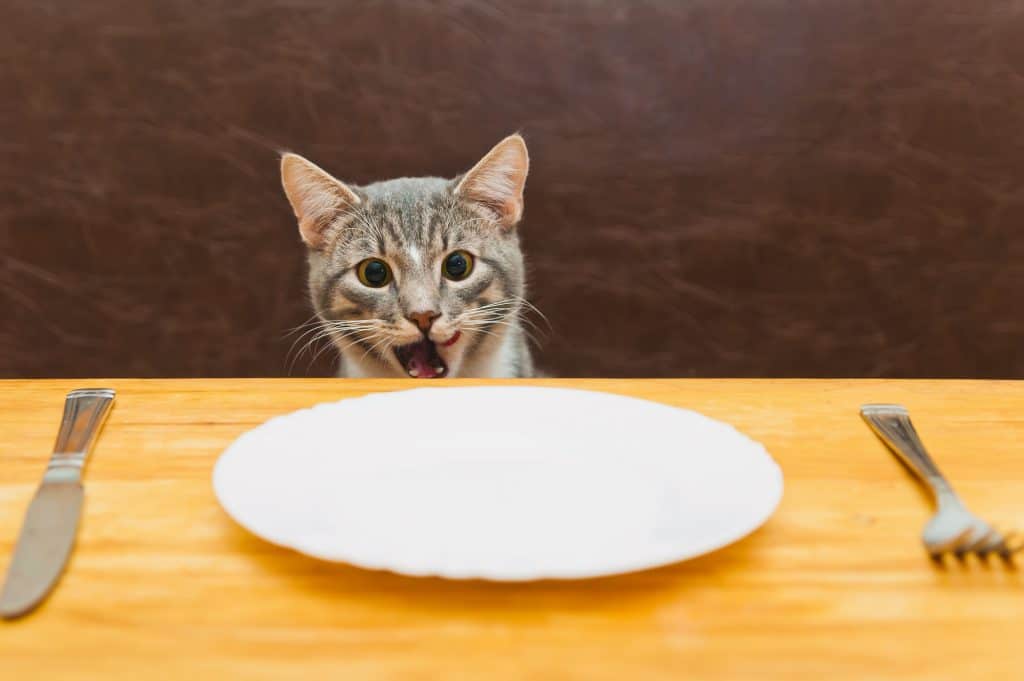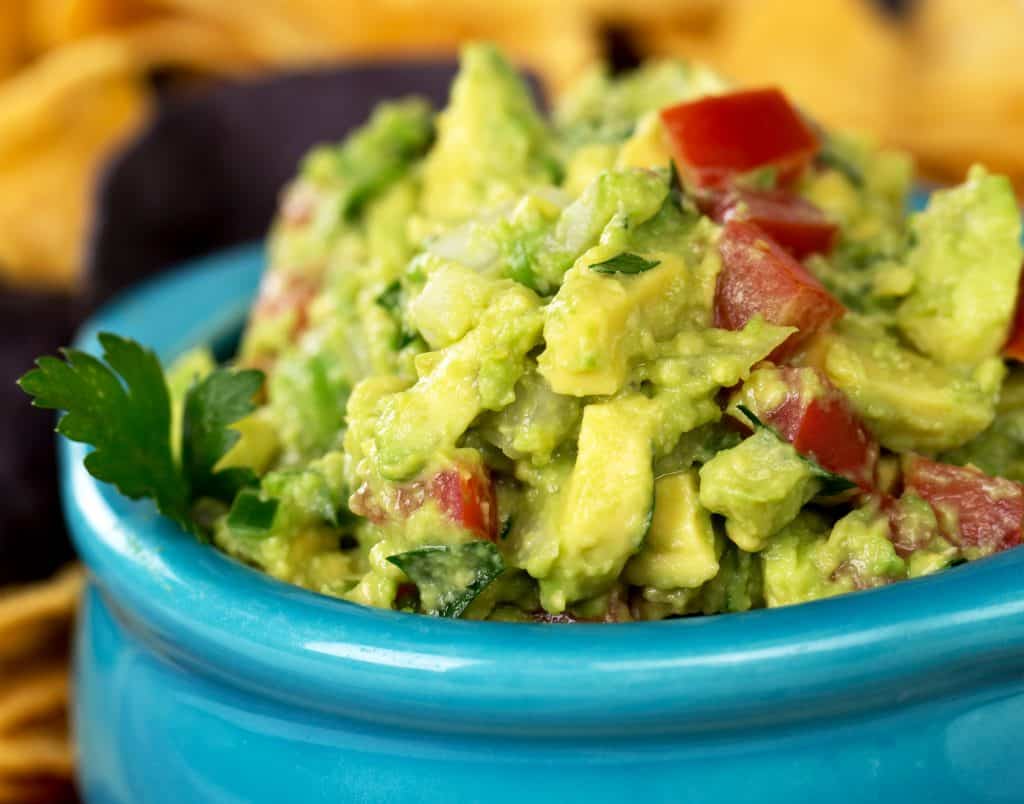Guacamole is incredibly popular as a healthy food among human beings but is this food also healthy for our cats. Can cats eat guacamole?
This article will dive into the answer to this question, explain the risks of feeding guacamole to cats, as well as provide better alternative human foods to give your feline.
Can Cats Eat Guacamole?
No, it’s not recommended to feed your cats guacamole, because the main ingredient is avocado which contains a persin toxin. Additionally, guacamole recipes include ingredients like garlic and onion, which can cause serious health issues related to red blood cells for cats.
Avocadoes have healthy fats and are filled with nutrients, but our feline friends have a different relationship to many types of human food.
Some human foods can be non-toxic or even beneficial to a cat’s diet, while many others can cause serious health issues that may have long-term effects.
What Is Guacamole?
Guacamole is a creamy substance that used as a dip for chips and crackers; you can use it to spread bread or as a topping for your favorite dish.
The primary ingredient in guacamole is avocado. The fruit of the Persea Americana tree, native to Central America; these avocadoes are mashed to be the sauce base.
Other ingredients are usually added to improve the flavor such as yogurt, lime juice, or even vinegar.
Nutritional Information For Guacamole
The nutritional breakdown of ¼ cup of guacamole is approximate:
- Calories: 109
- Fiber: 165mg
- Fat: 10g
- Sat Fat: 1g
- Mono Fat: 6.5g
- Unsat Fat: 8g
- Poly Fat: 1.2
- Carbs: 6g
- Potassium: 10% DV
- Sodium: 165mg
There is no doubt that guacamole is packed with vitamins and minerals; these are just a few that are included:
- Vitamin B6
- Vitamin C
- Vitamin A
- Magnesium
- Fiber
- Potassium
- Healthy Fats
Potential Hazards Of Feeding Guacamole To Your Cat
If consumed in large quantities (more than a teaspoon for some), avocado can have negative health impacts for your cat.
Avocado contains a toxin called Persin is concentrated in the leaves and bark of the avocado tree, also present in the seed and skin from which small quantities may filter into the fruit. This toxin can cause health problems such as:
- Vomiting
- Stool obstruction
- Diarrhea
- Pancreatitis
Even though the effects are moderately mild, the pit of the avocado can be a choking hazard or intestinal tract if it gets past the stomach.
It’s advised to keep avocados out of reach of your cats.
What Guacamole Ingredients Are Harmful to Cats?
Garlic or onions are most likely to be added to your favorite guacamole recipe – this is where the danger comes in for cats. Your cat should never eat foods that contain garlic (this includes garlic powder).
Garlic contains compounds like disulfides and thiosulphates. They cause red blood cells that circulate through a cat’s body to become very fragile and burst, destroying a cat’s red blood cells known as hemolytic anemia.
Onions are not as toxic as garlic but should still not be consumed by cats. All types of onions contain disulfides and thiosulphates.
The allium family of vegetables also contain these compounds and shouldn’t be fed to cats, these include:
- Leeks
- Shallots
- Scallions
- Chives
If your cat ingests garlic or onion; symptoms of toxicity may not appear until 2 – 4 days; keep a close eye on your cat for any of the below toxicity symptoms:
- Drooling
- Vomiting
- Pale gums
- Lethargy
- Discolored urine
- Weakness
- Panting
Are There Any Benefits To Feeding Your Cats Guacamole?
No, there are no known benefits to feeding your cats guacamole; chances are you will be doing more harm than good.
Even adding citrus fruits such as lime or tomatoes to your guacamole can cause damage to your cat’s heart and stomach.
Other Human Foods That Are A Better Alternative to Guacamole
If you are looking to change up your cat’s diet with some healthy feline treats that are also human foods, vegetables are a great alternative to regular prepacked snacks.

Cat owners can also add some meat or eggs to their cat’s food as an extra bonus. Although some human foods are safe for cat, generally you want to feed them sparingly.
Below is a list of vegetables that are safe to add to your cat’s diet occassionally:
- Carrots
- Bell peppers (Green)
- Peas (can often be found in prepacked foods for cats and dogs)
- Broccoli
- Celery (some enjoy the crunch)
- Pumpkin (a way to get fiber in your cat’s diet)
- Spinach (Jam-packed with vitamins – A, C, and K)
Being carnivores, cats have a diet made up mainly of protein. Here are some protein sources you can add to you cat’s diet:
- Turkey
- Canned fish
- Lamb
- Skinless chicken
- Lean beef
- Lean deli meats
- Cooked salmon – omega-3 fatty acids help with kidney disease, arthritis, vision, and heart disorders
- Cooked eggs
There are varying opinions on whether cats should consume dairy. Although some cats may be able to tolerate more dairy than others, all cats will handle dairy differently.
Many cats will be able to tolerate small amounts of lower lactose dairy products on an infrequent basis.
Some dairy products that can be consumed in small quantities by cats are:
- Hard cheeses (like cheddar, swiss, or gouda)
- Low-lactose cheeses
- Yogurt (plain, unsweetened, low-fat)
Do not replace a cat’s properly formulated cat food with human food, as this could deprive your cat of a balanced diet.
Treats are not a balanced diet and shouldn’t make up a substantial portion of their daily consumption.
Conclusion
Guacamole should not be on the list of foods to feed your cat. Guacamole contains toxins and risks associated with health complications that could affect their stomach, red blood cells, or even heart.
There are alternative human food products that could be given instead of guacamole, such as vegetables, certain meat, or eggs. However, it is best to stick to their regular dry or wet food to fulfill their dietary needs.

